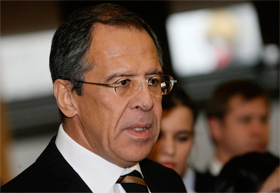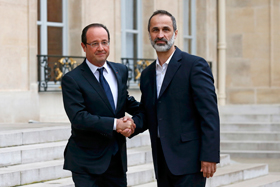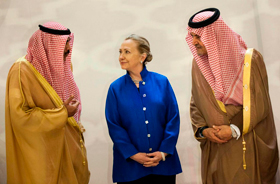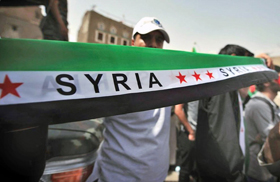At its fourth conference on December 12, 2012 in the picturesque Moroccan city of Marrakech, the Friends of Syria Group made no bones about changing the Bashar Assad regime, thus unveiling a new stage of the Syrian crisis.
Although the second seven-year presidential term of Assad Jr. expires in 2014, his chances of staying in his post for the full term seem slim, despite the 2012 Constitution that allows him to run two more times and retain power through 2028.
The Morocco forum has clearly shown that the outlook is hopeless, and that was the meeting's main result. All the other issues are just details dependent on the unfolding dynamics of the situation. For example, it is still not known whether the United States and its allies (the Group of Friends unites over 70 countries and organizations) find boosting support for the opposition, and establishing buffer and no-fly zones along the Syrian borders, primarily with Turkey, sufficient.
For NATO, this scenario seems preferable, but the alliance may be made to directly engage if, for example, Syria threatens to use chemical weapons.
President Obama's Surprise for Foreign Minister Lavrov
The Group of Friends has chosen the core structure for reforms from the multitude of rebel organizations. This is the Syrian National Coalition for Opposition and Revolutionary Forces, whose creation was announced on November 11 in the Qatari capital Doha, and which functions as an umbrella organization for about 10 key opposition groups, that were brought together with difficulty by international mediators including Western countries, the monarchies of the Persian Gulf and Turkey.
The National Coalition is headed by Ahmed Mouaz al Khatib, former geologist and imam of the Damascus Mosque, who is assisted by three deputies – businessman and ex-deputy Riad Seif, female activist Suheir al Attasi, and Christian George Sabra a well-known opposition figure who was recently elected leader of the Syrian National Council (the post was to go to a Kurd, which meant that until now it had been under dispute). Mustafa Sabbagh is the coalition's secretary-general responsible for finances.
The Morocco meeting’s joint decision added something new to the process, which was also included in its final declaration, recognizing the National Coalition as the legitimate representative of the Syrian people. Hence, it acquires the same role as the National Transitional Council in Libya, which was legitimized by over one hundred states by the time that Muammar Gaddafi was overthrown and killed.
The National Coalition is intended as a temporary body needed to establish a Syrian transitional government in late 2012 or in early 2013 at the latest. Despite differences among the participants, the coalition should last until H-hour and beyond, until the situation stabilizes and a new parliament is elected.
Numerous Arab states recognized the National Coalition in mid-November. France was also at the vanguard, as the Socialist victory in the country’s spring 2102 elections has done nothing to change Paris’ stance on the Middle East. However, Washington did not rush its recognition, adding a certain suspense to the proceedings.
It was on the eve of the Morocco meeting that Barack Obama made a TV announcement about this. The conference's final declaration confirmed his promise, while high ranking diplomats from various countries added their voices to the opposition demand for the resignation of Bashar Assad, the 47-year-old president of Syria.
Moscow’s response was swift. At the December 12 press conference Foreign Minister Sergey Lavrov said: “It was quite a surprise to learn that, by announcement of its president, the United States has recognized the coalition as the only legitimate representative of the Syrian people, contradicting the accords stipulated by the Geneva communiqué…”
At the meeting in Geneva last June 12, the intermediaries (Russia and the United States included) agreed to launch a dialogue between Syria’s warring parties – aiming at a truce. The minister just reiterated that the accords suggest “launching a Syria-wide dialogue between the government-appointed representatives on one side, and opposition delegates, on the other.” “… the United States seems to have backed the military victory of the National Coalition for Opposition and Revolutionary Forces”… “For us, the voiced recognition is quite unexpected,” said Foreign Minister of Russia.
Whether or not the Russian minister really was surprised is subject to speculation. But ahead of the Morocco conference, the Group of Friends did not veil their desire to see a new phase of the Syrian crisis begin. “Mr. Obama’s announcement, in an interview with Barbara Walters of ABC News on the eve of a meeting in Morocco of the Syrian opposition leaders and their supporters, was widely expected,” the New York Times reported. “… it marks a new phase of American engagement in a bitter conflict.”.
Why the Opposition Needs a New Umbrella
As the Marrakech conference stated, ignoring the positions of Russia and China, the Syrian National Council (SNC) established in 2011 lies at the coalition’s core. The body functions as a peculiar umbrella for the struggle against “the Assad regime” by a mix of secular opposition forces and members of the religious Muslim Brotherhood organization, which was banned in Syria years ago.
But why is there a need for a new coalition, if the SNC is alive and kicking? The answer, judging from occasional conversations with the leaders of the various Syrian opposition groups, seems to be as follows: the SNC is discredited by strife and disunity. For example, Radwan Ziadi, a well-known human rights activist who in June 2011 came to Moscow with the first Syrian opposition delegation, recently left the Council.
At that time the Russian foreign minister found a plausible pretext to evade receiving these opposition figures, but since then a number of them have had the honor. However, the opposition’s problem lies in its ever-shifting makeup, meaning that recent allies often trade accusations and refuse to sit at the same table.
Given this context, can the National Coalition make a difference? soothe answer is by no means certain. In fact, there has been no real integration of the opposition forces. Certain Kurdish organizations prefer to remain aloof. There is a sizable émigré community, but few operating within Syria. Some émigré groups either refused to join or were not invited. Recent defectors from the Assad camp, for example general Manaf Tlass, also prefer not to join.
The Coalition is also boycotted by the Syrian National Coordination Committee chaired by Hassan Abdel Azim. During his visit to Moscow in late November he explicitly stated that his bloc supports continued cooperation with Russia, and even the retention of Russia’s naval facility in the port of Tartus.
There are numerous examples, but the best came from the Americans. On December 11, the State Department spokesperson made an important statement timed to coincide with the Group of Friends conference, announcing that one of the Syrian rebel groups, i.e. al-Nusrah Front, shall be designated as terrorist. The U.S. intelligence community knows it as an alias for al-Qaida in Iraq, operating just across the Syrian border.
By assisting with the establishment of the National Coalition, the United States and their allies have not united the opposition, but instead created the semblance of an association that will act as a breeding ground for the further escalation of the Syrian conflict.
Why the Americans Were Slow
Some might say that the Group of Friends would inevitably get down to work on radical changes in the country. But they would be wrong. Doubts existed, primarily in Washington, whose role, as shown by Libya in 2011, remains foremost both politically and militarily.
However, the United States is not keen to be fully committed to the Middle East, since the situation is too complicated and unpredictable. After Ambassador Christopher Stevens, who enthusiastically helped topple Gaddafi, was killed in Benghazi on September 11, the skeptics’ anxieties deepened: is this the democratic Libya that Stevens had fought for?
Many Arab countries are in for a lengthy period of volatility, whereas Islamists seem to be the best organized force that cannot be bypassed – even by those unwilling to interact with them. By and large, the region looks a world away from the vision of a friendly Greater Middle East as conceptualized by the U.S. back in 2004.
Former secretary of state Henry Kissinger has said that the “Somalization” of Syria could become a reality. This would mean an extended civil war, more victims, destroyed infrastructure, division of the territory between groups, terrorism and a mushrooming of criminal gangs. This scenario is quite likely after Assad steps aside, even though he is clearly unable to restore order.
Another important issue lies in the observance of the international rules of the game. Of course, Russia wants to see the preservation of the initial international norms, as they are more in line with its interests. But stating that one party prefers “managed chaos” (which is an oxymoron in itself) is also far from accurate. In any case, the Americans are clearly trying to calculate the various risks involved.
Mr. Kissinger titled his article Syrian Intervention Risks Upsetting Global Order, posing questions to which neither he nor – more importantly – the ruling politicians have answers. For example, will Saudi Arabia remain a U.S. ally once popular unrest spreads over its territory? Should America be committed to support any popular movement against any non-democratic government? What if the government in question plays a key role in international stability? Or in regional security?
With these significant strategic questions still unanswered, the United States and its allies are trying to take a more vigorous approach. Note that since its establishment in late February 2012, the Friends of Syria Group has held only four conferences in Tunisia, Turkey, France and the latest one in Morocco. Initially, the meetings were bimonthly, then once in three months, and after the third one in Paris there was an interval of more than five months.
This was not just due to the need to wait until after the November 6 elections in the United States. More cautious than his Republican rival, Obama had to make sure that the risks of remaining aloof with regard to developments in Syria would definitely be higher than the risks of taking action.
The Libyan experience here seems helpful. Not many people remember that the Libya Contact Group was established in late March 2011, just 10 days after the war broke out. Later, not long before Gaddafi was deposed and killed, it was converted into the Friends of Libya group. The Syrian case is more complicated. Russia and China appear less compliant, meaning that the Group of Friends should be established further in advance. There is noticeably less zeal and more and more calculation – just as when crossing a minefield. That is, perhaps, the most appropriate analogy for Syria: a minefield.









